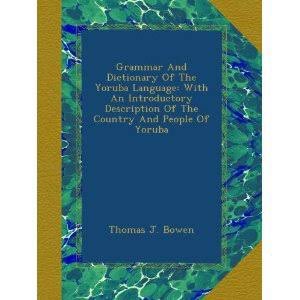The Word O
Central Africa by Rev Thomas Jefferson Bowen of the Baptist Mission (Yoruba-Abeokuta & Ijaye)
Washington August 1857
“The Yorubas have a profusion of salutations.
In the morning it is o ji re(o jí ire)? 'did you wake well,' and the person replies, 'God be thanked.'
Central Africa by Rev Thomas Jefferson Bowen of the Baptist Mission (Yoruba-Abeokuta & Ijaye)
Washington August 1857
“The Yorubas have a profusion of salutations.
In the morning it is o ji re(o jí ire)? 'did you wake well,' and the person replies, 'God be thanked.'
On taking leave at night, they often say, 'May you sleep well.' (Ká sùn’re)
When a visitor retires, and frequently when you meet him in the street you say e wo' leh(e wo’lè), 'look at the ground,' that is, to prevent stumbling.
When a visitor retires, and frequently when you meet him in the street you say e wo' leh(e wo’lè), 'look at the ground,' that is, to prevent stumbling.
'Be careful' (e ro’ra) is often' a salutation on passing a person in the road.
But the word most used by everybody, is oku or aku, properly aiku, 'may you not die,' or more exactly 'immortality.'
But the word most used by everybody, is oku or aku, properly aiku, 'may you not die,' or more exactly 'immortality.'
When you visit a man who wishes to pay you particular respect he will salute you aku!, aku! perhaps twenty times, and you must invariably answer, O, to each salutation.
This word O expresses assent.
This word O expresses assent.
If you say to your servant, do so and so, he replies O, and if you perform any little incidental act of politeness, as picking up a thing that has dropped for a person, he may say O, instead of 'thank you.'
The word aku is compounded with many others, so as to form an appropriate salutation for every situation in life.
When they meet a man traveling, they often say, akurin (a kú’rìn), because rin means to walk or travel.
When they meet a man traveling, they often say, akurin (a kú’rìn), because rin means to walk or travel.
So we have akuale (a kú alé), good evening, akuoro ( a kú àáró), good morning, akuassan (a kú òsán), good day, akule (a kú’lé), to one in a house, aku joko ( a kú’jòkó), to one sitting down, akushe ( a kú’sé), to one at work, and so on, to a hundred examples.
To all these you reply O, and if you make no reply, it is considered a gross insult.”
This thread illustrates how our language & usage has changed in the space of about 160 years.
The words in bracket are the modern renderings.
Greetings like e wo’lè, e ro’ra & e pèlé(be calm) are no longer in normal use or used differently, e.g., e pèlé is now used as sorry.
The words in bracket are the modern renderings.
Greetings like e wo’lè, e ro’ra & e pèlé(be calm) are no longer in normal use or used differently, e.g., e pèlé is now used as sorry.
The greeting of aku repeatedly had sadly passed out of use, as the world became busier. It was still practiced up till about the ‘60s. It can still be found in Ilorin and environs, up to Kogi, among some patrician families.
It must also be noted that the greeting aku or oku is not universal. Among the peoples of north eastern Yoruba and the eastern parts of Yoruba land, (what’s today called Okunland,) up to Jebba and Lokoja, it’s often rendered as okun, properly strength or vitality.

 Read on Twitter
Read on Twitter




